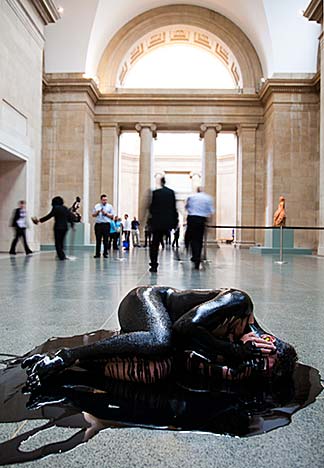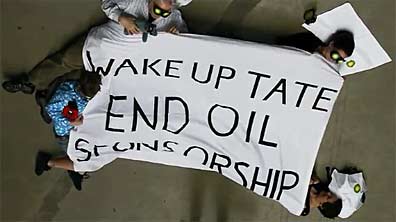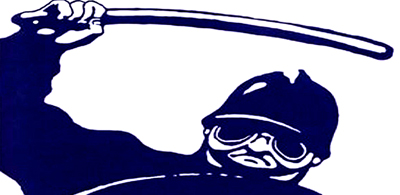An end to oil company sponsorship of the arts
In marking the one year anniversary of the catastrophic BP oil spill in the Gulf of Mexico, I signed a letter of protest along with 165 other arts professionals and activists that appeared in the Guardian on April 20, 2011. Titled Tate should end its relationship with BP, the letter calls on the Tate Gallery of London “to demonstrate its commitment to a sustainable future by ending its sponsorship relationship with BP.”
The letter reads in part:
“In the year since their catastrophic oil spill in the Gulf of Mexico, BP have massively ramped up their investment in controversial tar sands extraction in Canada, have shown to be a key backer of the Mubarak regime in Egypt and have attempted to commence drilling for oil in the Arctic Ocean. While BP continues to jeopardize ecosystems, communities and the climate by the reckless pursuit of ‘frontier’ oil, cultural institutions like Tate damage their reputation by continuing to be associated with such a destructive corporation.”
Signatories to the letter include the likes of writer and art critic Lucy R. Lippard, painter John Keane, artist and Stuckist co-founder Charles Thomson, artist Billy Childish, and many others. Anti-corporate globalization activist and author of The Shock Doctrine, Naomi Klein, was also a signatory.
While directed at the Tate, the Guardian letter by implication calls upon all art institutions to end their partnerships with BP specifically and with oil companies in general. I first began writing about the relationship between BP and the Los Angeles County Museum of Art (LACMA) in 2007. The Director of LACMA, Michael Govan, had just accepted a $25 million “gift” from BP, monies the museum would use in part to build a new entry gate, the ill-named “BP Grand Entrance”. That first muckraking article was followed by a multitude of other commentaries and critical essays that further exposed the saga of BP and LACMA; by the look of things this current post will not be my last entry on the matter.
Since the BP disaster in the Gulf of Mexico exactly one year ago, much has been learned about the oil company’s affairs. PLATFORM brought to light the oil giant’s close relationship with former dictator of Egypt, Hosni Mubarak, now under investigation for ordering the murder of hundreds of protestors during the three-week long pro-democracy uprising that toppled his regime. Last February I wrote about the collaboration between BP and Colonel Muammar Gaddafi – a friendly and quite lucrative business relationship that culminated in a deal worth billions. On April 16, 2011, Al Jazeera published an in-depth report by independent U.S. journalist Dahr Jamail. His BP anniversary: Toxicity, suffering and death is about as excoriating an account of corporate and government irresponsibility likely to be found.
On April 19, 2011, The Independent published Secret memos expose link between oil firms and invasion of Iraq, a timely report that verifies the U.K. government was holding meetings with BP, Shell and BG (British Gas), on “post regime change” opportunities for oil exploitation – a year before the war on Iraq began. Minutes from one Nov. 2002 government meeting with BP noted; “Iraq is the big oil prospect. BP is desperate to get in there and anxious that political deals should not deny them the opportunity.” At another meeting held in Oct. 2002, the government’s Foreign Office Middle East director noted, “Shell and BP could not afford not to have a stake in Iraq for the sake of their long-term future. We were determined to get a fair slice of the action for UK companies in a post-Saddam Iraq.” Indeed, after the war, BP was awarded 20-year contracts on some of the largest of Iraq’s oil fields containing upwards of 60 billion barrels of oil.
Here the reader should be reminded that in a 2007 interview in the Los Angeles Times, LACMA Director Michael Govan offered a truly laughable justification for taking BP’s millions – he cited the oil giant’s “commitment to sustainable energy.” Since then Mr. Govan has fallen silent regarding the matter of BP sponsorship of the Los Angeles County Museum of Art. One must ask why in all these years the Los Angeles Times has published only a single article that questions the wisdom of LACMA taking money from BP. Art critic Christopher Knight offered a mild rebuke of Govan in his May 18, 2010 article, BP Grand Entrance at LACMA looking not-quite-so-grand, but the article was hardly an in-depth critique that offered solid details on BP’s terrible record.

Also occurring on the one year anniversary of the BP oil spill in the Gulf of Mexico, artists from the U.K. activist group, Liberate Tate, staged an intervention they titled “Human Cost” at the Tate Britain.
On Wednesday April 20, 2011, a number of silent figures peacefully entered Duveens Hall of the Tate where the exhibit Single Form: The Body in Sculpture from Rodin to Hepworth was on display; the exhibit is part of a series of “BP British Art Displays” staged throughout the Tate.
A nude member of the Liberate Tate group assumed a fetal position on the floor in the middle of the room, while veiled comrades dressed in black poured what appeared to be oil over him from containers emblazoned with BP logos (the substance was actually ground charcoal and sunflower oil).
The motionless naked man, slick with viscous black goo, looked as if he were trapped in the globs of crude oil dumped into the Gulf of Mexico by BP exactly one year ago. Eventually museum security directed museum goers out of the room, placing a screen around the area to hide the action from public view. In due course the protestors left the museum and a clean-up crew dealt with the aftermath. To my knowledge there were no arrests. England’s Channel 4 also broadcast coverage of the event.
Sandra Paige, a participant in the intervention/performance, said the following about her group’s action; “It’s astonishing that Nick Serota and other Tate executives can be so blind to the horrific social and environmental impacts that BP is responsible for around the world. From the destruction of fisher folks’ livelihoods in the Gulf of Mexico, to the indigenous communities in Canada fearing for their very survival – the human cost of BP’s oil extraction is staggering.”
Terry Taylor of the Liberate Tate group said of the April 20 intervention; “Many important cultural institutions have been the victim of the government’s cuts in arts funding recently. The fact that many organizations will be actively looking for new funding means that the debate around the ethics of corporate sponsorship is more important than ever. Oil companies like BP are responsible for environmental and social controversy all over the world, and we can’t let their sponsorship of institutions like Tate detract from that fact.”

April 20 was the culmination of a BP Week Of Action called by U.K. groups Liberate Tate, Art Not Oil, Climate Camp London, UK Tar Sands Network, Climate Rush, Indigenous Environmental Network, and London Rising Tide. Under the slogan of “BP and culture: time to break it off”, the groups held a number of public campaigns, the most amusing of which was an April 17 mass flash mob occupation and sleep-in at the Tate Modern, where some 100 protestors with BP-branded blankets, pillows, pajamas, teddy bears, and alarm clocks held a sleep-in among the art works. A video documenting the Great BP Sponsored Tate Modern Sleep In can be viewed on YouTube.

Gallery visitors were told that BP sponsorship of the arts was “sleep walking us into climate crisis” and “BP’s relationship with this gallery is one of the ways that BP buys our acceptance – it tries to distract us from the crimes against people, from the crimes against the environment, that they are currently conducting around the world. We are here because we believe that sponsorship is part of the massive PR offensive that BP is engaged in all the time.”
In reporting on the April 20 “Human Cost” intervention at Tate Britain, Channel 4’s Matthew Cain said the following; “An over-reliance on corporate funding of any description can lead to a climate of creative caution and conservatism, and at worst, fear. There’s evidence of this in the US but, although our model of arts funding is slowly moving closer to the American model, so far there doesn’t seem to be any evidence of it here.”
Matthew’s comments are certainly stinging, and it pains me that here in the United States – where BP virtually destroyed the Gulf of Mexico – there are no mass protests marking the one year anniversary of America’s largest ecological disaster. This makes the signing of the Guardian protest letter by American artists that much more noteworthy. I am proud to stand with all those calling for an end to oil company sponsorship of the arts. Hopefully the April 20th actions in the UK will be an inspiring preamble to similar events in the United States.



